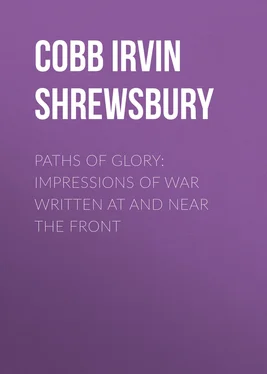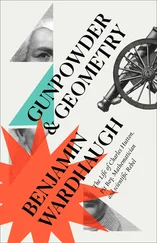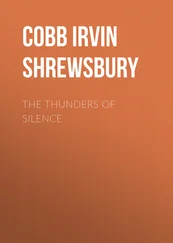Irvin Cobb - Paths of Glory - Impressions of War Written at and Near the Front
Здесь есть возможность читать онлайн «Irvin Cobb - Paths of Glory - Impressions of War Written at and Near the Front» — ознакомительный отрывок электронной книги совершенно бесплатно, а после прочтения отрывка купить полную версию. В некоторых случаях можно слушать аудио, скачать через торрент в формате fb2 и присутствует краткое содержание. Жанр: prose_military, История, foreign_edu, foreign_antique, foreign_prose, на английском языке. Описание произведения, (предисловие) а так же отзывы посетителей доступны на портале библиотеки ЛибКат.
- Название:Paths of Glory: Impressions of War Written at and Near the Front
- Автор:
- Жанр:
- Год:неизвестен
- ISBN:нет данных
- Рейтинг книги:3 / 5. Голосов: 1
-
Избранное:Добавить в избранное
- Отзывы:
-
Ваша оценка:
- 60
- 1
- 2
- 3
- 4
- 5
Paths of Glory: Impressions of War Written at and Near the Front: краткое содержание, описание и аннотация
Предлагаем к чтению аннотацию, описание, краткое содержание или предисловие (зависит от того, что написал сам автор книги «Paths of Glory: Impressions of War Written at and Near the Front»). Если вы не нашли необходимую информацию о книге — напишите в комментариях, мы постараемся отыскать её.
Paths of Glory: Impressions of War Written at and Near the Front — читать онлайн ознакомительный отрывок
Ниже представлен текст книги, разбитый по страницам. Система сохранения места последней прочитанной страницы, позволяет с удобством читать онлайн бесплатно книгу «Paths of Glory: Impressions of War Written at and Near the Front», без необходимости каждый раз заново искать на чём Вы остановились. Поставьте закладку, и сможете в любой момент перейти на страницу, на которой закончили чтение.
Интервал:
Закладка:
When we came to where the street leading to the Square of Saint Jacques joined the street that led in turn to the Brussels road, all the people there were crouching in their doorways as quiet as so many mice, all looking in the direction in which we hoped to go, all pointing with their hands. No one spoke, but the scuffle of wooden-shod feet on the flags made a sliding, slithering sound, which someway carried a message of warning more forcible than any shouted word or sudden shriek.
We looked where their fingers aimed, and, as we looked, a hundred feet away through a cloud of dust a company of German foot soldiers swung across an open grassplot, where a little triangular park was, and straightened out down the road to Brussels, singing snatches of a German marching song as they went.
And behind them came trim officers on handsome, high-headed horses, and more infantry; then a bicycle squad; then cavalry, and then a light battery, bumping along over the rutted stones, with white dust blowing back from under its wheels in scrolls and pennons.
Then a troop of Uhlans came, with nodding lances, following close behind the guns; and at sight of them a few men and women, clustered at the door of a little wine shop calling itself the Belgian Lion, began to hiss and mutter, for among these people, as we knew already, the Uhlans had a hard name.
At that a noncommissioned officer—a big man with a neck on him like a bison and a red, broad, menacing face—turned in his saddle and dropped the muzzle of his black automatic on them. They sucked their hisses back down their frightened gullets so swiftly that the exertion well-nigh choked them, and shrank flat against the wall; and, for all the sound that came from them until he had holstered his hardware and trotted on, they might have been dead men and women.
Just then, from perhaps half a mile on ahead, a sharp clatter of rifle fire sounded—pop! pop! pop!—and then a rattling volley. We saw the Uhlans snatch out their carbines and gallop forward past the battery into the dust curtain. And as it swallowed them up we, who had come in a taxicab looking for the war, knew that we had found it; and knew, too, that our chances of ever seeing that taxicab again were most exceeding small.
We had one hope—that this might merely be a reconnaissance in force, and that when it turned back or turned aside we might yet slip through and make for Brussels afoot. But it was no reconnaissance—it was Germany up and moving. We stayed in Louvain three days, and for three days we watched the streaming past of the biggest army we had ever seen, and the biggest army beleaguered Belgium had ever seen, and one of the biggest, most perfect armies the world has ever seen. We watched the gray-clad columns pass until the mind grew numb at the prospect of computing their number. To think of trying to count them was like trying to count the leaves on a tree or the pebbles on a path.
They came and came, and kept on coming, and their iron-shod feet flailed the earth to powder, and there was no end to them.
Chapter 3
Sherman Said It
Undoubtedly Sherman said it. This is my text and as illustration for my text I take the case of the town of La Buissière.
The Germans took the town of La Buissière after stiff fighting on August twenty-fourth. I imagine that possibly there was a line in the dispatches telling of the fight there; but at that I doubt it, because on that same date a few miles away a real battle was raging between the English rear guard, under Sir John French, of the retreating army of the Allies, falling back into France, and the Germans. Besides, in the sum total of this war the fall of La Buissière hardly counts. You might say it represents a semicolon in the story of the campaign. Probably no future historian will give it so much as a paragraph. In our own Civil War it would have been worth a page in the records anyway. Here upward of three hundred men on both sides were killed and wounded, and as many more Frenchmen were captured; and the town, when taken, gave the winners the control of the river Sambre for many miles east and west. Here, also, was a German charge with bayonets up a steep and well-defended height; and after that a hand-to-hand melee with the French defenders on the poll of the hill.
But this war is so big a thing, as wars go, that an engagement of this size is likely to be forgotten in a day or a week. Yet, I warrant you, the people of La Buissière will not forget it. Nor shall we forget it who came that way in the early afternoon of a flawless summer day. Let me try to recreate La Buissière for you, reader. Here the Sambre, a small, orderly stream, no larger or broader or wider than a good-sized creek would be in America, flows for a mile or two almost due east and weSt. The northern bank is almost flat, with low hills rising on beyond like the rim of a saucer. The town—most of it—is on this side. On the south the land lifts in a moderately stiff bluff, perhaps seventy feet high, with wooded edges, and extending off and away in a plateau, where trees stand in well-thinned groves, and sunken roads meander between fields of hops and grain and patches of cabbages and sugar beets. As for the town, it has perhaps twenty-five hundred people— Walloons and Flemish folk—living in tall, bleak, stone houses built flush with the little crooked streets. Invariably these houses are of a whitish gray color; almost invariably they are narrow and cramped- looking, with very peaky gables, somehow suggesting flat-chested old men standing in close rows, with their hands in their pockets and their shoulders shrugged up.
A canal bisects one corner of the place, and spanning the river there are—or were—three bridges, one for the railroad and two for foot and vehicular travel. There is a mill which overhangs the river—the biggest building in the town—and an ancient gray convent, not quite so large as the mill; and, of course, a church. In most of the houses there are tiny shops on the lower floors, and upstairs are the homes of the people. On the northern side of the stream every tillable foot of soil is under cultivation. There are flower beds, and plum and pear trees in the tiny grass plots alongside the more pretentious houses, and the farm lands extend to where the town begins.
This, briefly, is La Buissière as it looked before the war began—a little, drowsy settlement of dull, frugal, hard-working, kindly Belgians, minding their own affairs, prospering in their own small way, and having no quarrel with the outside world. They lived in the only corner of Europe that I know of where serving people decline to accept tips for rendering small services; and in a simple, homely fashion are, I think, the politest, the most courteous, the most accommodating human beings on the face of the earth.
Even their misery did not make them forget their manners, as we found when we came that way, close behind the conquerors. It was only the refugees, fleeing from their homes or going back to them again, who were too far spent to lift their caps in answer to our hails, and too miserably concerned with their own ruined affairs, or else too afraid of inquisitive strangers, to answer the questions we sometimes put to them.
We were three days getting from Brussels to La Buissière—a distance, I suppose, of about forty-five English miles. There were no railroads and no trams for us. The lines were held by the Germans or had been destroyed by the Allies as they fell back. Nor were there automobiles to be had. Such automobiles as were not hidden had been confiscated by one side or the other.
Moreover, our journey was a constant succession of stops and starts. Now we would be delayed for half an hour while some German officer examined the passes we carried, he meantime eying us with his suspicious squinted eyes. Now again we would halt to listen to some native's story of battle or reprisal on ahead. And always there was the everlasting dim reverberation of the distant guns to draw us forward. And always, too, there was the difficulty of securing means of transportation.
Читать дальшеИнтервал:
Закладка:
Похожие книги на «Paths of Glory: Impressions of War Written at and Near the Front»
Представляем Вашему вниманию похожие книги на «Paths of Glory: Impressions of War Written at and Near the Front» списком для выбора. Мы отобрали схожую по названию и смыслу литературу в надежде предоставить читателям больше вариантов отыскать новые, интересные, ещё непрочитанные произведения.
Обсуждение, отзывы о книге «Paths of Glory: Impressions of War Written at and Near the Front» и просто собственные мнения читателей. Оставьте ваши комментарии, напишите, что Вы думаете о произведении, его смысле или главных героях. Укажите что конкретно понравилось, а что нет, и почему Вы так считаете.












